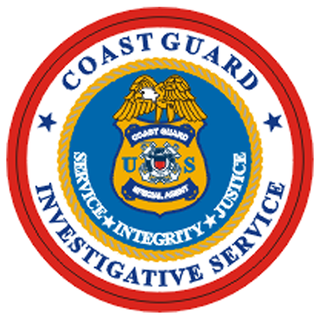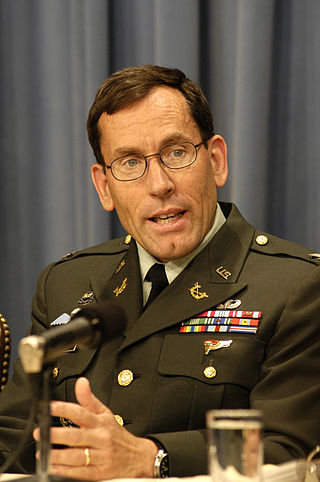Related Research Articles

Counterterrorism, also known as anti-terrorism, relates to the practices, military tactics, techniques, and strategies that governments, law enforcement, businesses, and intelligence agencies use to combat or eliminate terrorism.

The Hostage Rescue Team (HRT) is the Federal Bureau of Investigation's (FBI) elite tactical unit. The HRT was formed to provide a full-time federal law enforcement tactical capability to respond to major terrorist incidents throughout the United States. Today, the HRT performs a number of tactical law enforcement and national security functions in high-risk environments and conditions and has deployed overseas, including with military Joint Special Operations Command (JSOC) units. In an article to mark its 40th anniversary, it was reported that since its formation in 1983 the HRT had deployed more than 900 times.

Counterintelligence (counter-intelligence) or counterespionage (counter-espionage) is any activity aimed at protecting an agency's intelligence program from an opposition's intelligence service. It includes gathering information and conducting activities to prevent espionage, sabotage, assassinations or other intelligence activities conducted by, for, or on behalf of foreign powers, organizations or persons.

The Counterterrorism Division (CTD) is a division of the National Security Branch of the Federal Bureau of Investigation. CTD investigates terrorist threats inside the United States, provides information on terrorists outside the country, and tracks known terrorists worldwide. In the wake of the September 11 attacks in 2001, CTD's funding and manpower have significantly increased.

The United States Naval Criminal Investigative Service (NCIS) is the primary investigative law enforcement agency of the U.S. Department of the Navy. Its primary function is to investigate major criminal activities involving the Navy and Marine Corps, though its broad mandate includes national security, counterintelligence, counterterrorism, cyberwarfare, and the protection of U.S. naval assets worldwide. NCIS is the successor organization to the former Naval Investigative Service (NIS), which was established by the Office of Naval Intelligence after the Second World War.

The Coast Guard Investigative Service (CGIS) is a division of the United States Coast Guard that investigates crimes where the U.S. Coast Guard has an interest. It is composed of civilian (GS-1811), active duty, reserve enlisted, and warrant officer special agents.

Colonel Frederic L. Borch was a career United States Army attorney with a master's degree in national security studies, who served as chief prosecutor of the Guantanamo military commissions. He resigned his commission in August 2005 after three prosecutors complained that he had rigged the system against providing due process to defendants. He was replaced by Robert L. Swann
The Criminal Investigation Task Force (CITF) is an organization created in early 2002 by the United States Department of Defense to conduct investigations of detainees captured in the War on Terrorism. It was envisioned that certain captured individuals would be tried by a military tribunal for war crimes and/or acts of terrorism.

The United States Department of the Army Criminal Investigation Division (CID), previously known as the United States Army Criminal Investigation Command (USACIDC) is the primary federal law enforcement agency of the United States Department of the Army. Its primary function is to investigate felony crimes and serious violations of military law and the United States Code within the US Army. The division is an independent federal law enforcement agency with investigative autonomy; CID special agents, both military and civilian, report through the CID chain of command to the CID Director, who reports directly to the Under Secretary of the Army and the Secretary of the Army. Unlike their counterparts at OSI and NCIS, Army CID does not have primary counterintelligence responsibilities.
The counter-terrorism page primarily deals with special police or military organizations that carry out arrest or direct combat with terrorists. This page deals with the other aspects of counter-terrorism:
The United States Department of the Navy's Multiple Threat Alert Center (MTAC) provides indications and warning for a wide range of threats to Navy and Marine Corps personnel and assets around the world.

The United States Marine Corps Criminal Investigation Division is a federal law enforcement agency that investigates crimes against people and property within the United States Marine Corps.

Francis Xavier Taylor was the Under Secretary of Homeland Security for Intelligence and Analysis at the U.S. Department of Homeland Security (DHS), nominated by President Obama in 2014. In that role, he provided the Secretary, DHS senior leadership, the DHS components, and state, local, tribal and private sector partners with homeland security intelligence and information they need to keep the country safe, secure and resilient. DHS Office of Intelligence and Analysis is a member of, and the Department’s liaison to, the U.S. Intelligence Community.

United States Army Counterintelligence (ACI) is the component of United States Army Military Intelligence which conducts counterintelligence activities to detect, identify, assess, counter, exploit and/or neutralize adversarial, foreign intelligence services, international terrorist organizations, and insider threats to the United States Army and U.S. Department of Defense (DoD).
Following al Qaeda's attacks on 9-11 the Naval War College Foundation established the John Nicholas Brown Chair of Counterterrorism. The endowment fund campaign was chaired by former President George Herbert Walker Bush. United States Senator John McCain and former Chief of Naval Operations were the campaigns honorary co-chairs. The endowment fund campaign reached its goal in 2006.

The Master-at-Arms (MA) rating is responsible for law enforcement and force protection in the United States Navy—equivalent to the United States Army Military Police, the United States Marine Corps Military Police, the United States Air Force Security Forces, and the United States Coast Guard's Maritime Law Enforcement Specialist. It is one of the oldest ratings in the United States Navy, having been recognized since the inception of the U.S. Navy.

Terrorist Recognition Handbook: A Practitioner's Manual for Predicting and Identifying Terrorist Activities is a non-fiction book about counterterrorism strategies, written by U.S. Navy retired cryptology analyst Malcolm Nance. The book is intended to help law enforcement and intelligence officials with the professional practice of behavior analysis and criminal psychology of anticipating potential terrorists before they commit criminal acts. Nance draws from the field of traditional criminal analysis to posit that detecting domestic criminals is similar to determining which individuals are likely to commit acts of terrorism. The book provides resources for the law enforcement official including descriptions of devices used for possible bombs, a database of terrorist networks, and a list of references used. Nance gives the reader background on Al-Qaeda tactics, clandestine cell systems and sleeper agents, and terrorist communication methods.

Christopher P. Costa is a retired US Army intelligence officer with 34 years of service, culminating in his role as Special Assistant to the President and Senior Director for Counterterrorism at the National Security Council, White House. He is now the executive director of the International Spy Museum.

Omar R. Lopez is an American special agent and attorney serving as the sixth civilian director of the Naval Criminal Investigative Service (NCIS) since 2019. He is the first Hispanic American to serve in the role. Lopez was previously the executive assistant director for the NCIS national security directorate.
References
- ↑ Centennial Milestone. Vol. 51. Richmond, Kentucky: Eastern Kentucky University. 1974. p. 462. Retrieved 2020-12-13.
- 1 2 3 4 5 6 7 8 9 10 11 "Jeffrey H. Norwitz: SPECIAL AGENT NAVAL CRIMINAL INVESTIGATIVE SERVICE" (PDF). Military Order of The World Wars. Archived from the original (PDF) on 2011-07-14. Retrieved 2009-01-07.
- ↑ Jeffrey H. Norwitz (July–August 2005). "Defining Success at Guantanamo: By What Measure?" (PDF). Military Review. pp. 79–83. Archived (PDF) from the original on 2007-06-25. Retrieved 2009-01-07.
- ↑ "Terrorism Issues 2 days 3 instructors" (PDF). University of Rhode Island Center for Excellence for Explosive Detection, Mitigation and Response. Archived (PDF) from the original on 2017-06-13.
He received the 21st annual Defense Department Counterintelligence Award for education excellence in 2008. In February 2009, Mr. Norwitz spoke at the United Nations on global water security. Most recently, Mr. Norwitz was a Senior Instructor with the Counterterrorism Division at Federal Law Enforcement Training Center in Brunswick, Georgia.
- 1 2 3 "All Terrorism is Local" (PDF). Sark Securities. Archived from the original (PDF) on 2011-09-28. Retrieved 2011-09-28.
- ↑ Michael Gagne (2001-09-28). "Special agent offers perspectives on terrorism". Student Newspaper at the University of Rhode Island. Retrieved 2009-01-07.[ permanent dead link ] mirror
- ↑ Arline A. Fleming (2008-01-23). "Professor: Military constantly adapting". Providence Journal . Retrieved 2008-09-28.
- ↑ "AT THE COLLEGES". Providence Journal. 2006-10-01. Retrieved 2009-01-07.
- ↑ Matt Clark (2007-12-08). "Terrorism experts tell Lee audience: Knowledge is best weapon". Naples Daily News. Archived from the original on 2012-04-03. Retrieved 2009-01-07.
- ↑ Jeffrey H. Norwitz (August 2002). "Combating Terrorism: With a Helmet or a Badge?". Archived from the original on 2008-07-23. Retrieved 2009-01-07.
- ↑ Matthew Flynn (2006-10-10). "A nation's new recipe for coping with disaster". Old Dominion University. Archived from the original on 2012-04-04. Retrieved 2009-01-07.
- ↑ Jeffrey H. Norwitz, Editor. "Armed Groups: Studies in National Security, Counterterrorism, and Counterinsurgency". Archived from the original on 2010-11-07. Retrieved 2009-01-07.
{{cite news}}:|author=has generic name (help) - 1 2 3 4 5 6 7 Robin Stansbury (1995-03-23). "Ex-resident Gets 'Secret' Honor". Hartford Courant. Archived from the original on 2013-01-21. Retrieved 2011-09-28.